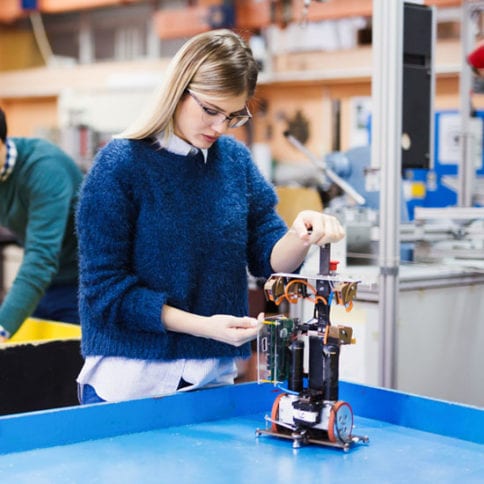Faculty often struggle to convert their innovative research ideas into meaningful projects, as their ideas can fly under the radar for funders, administrators, and research colleagues. For instance, faculty members’ research projects may be too small to meet grant funding requirements, or faculty members may have trouble marketing their ideas to other researchers to obtain personnel support.
To elevate these early-phase research projects, pioneering colleges and universities have implemented crowdfunding models and cross-disciplinary financing options.
Two universities in Michigan, Michigan Technology University and the University of Michigan, have taken steps to boost traditionally early-phase research projects on their campuses through their respective Superior Ideas and Mcubed programs.
Build an in-house research crowdfunding platform
Michigan Technological University created an in-house crowdfunding platform, Superior Ideas, for faculty to secure funding from potential donors who might not fit the traditional profile of major research gift providers. The platform’s GoFundMe-like design, simple language, and wide publicity allows the institution to expand their research donor pool to those who may be able to make only a small contribution toward a larger project. This also increases administrators’ ability to convert small-dollar donors into major contributors in the future.
$173K
Researchers submit information on project goals and funding needs to a team of Superior Ideas administrators, which approves projects based on alignment with the university’s mission. The platform publishes engaging multimedia profiles of approved projects and cross-promotes profiles on social media channels to market projects to prospective donors. Every published profile also displays traditional crowdfunding elements such as funding progress trackers.
Between 2012 and 2016, Superior Ideas received about $173,000 in individual donations and supported over 80 research projects. The platform’s digital nature maximizes its ability to reflect changing research needs and ensures quick access to funds. For example, during the current COVID-19 crisis, the platform is elevating crisis-relevant research and equipment manufacturing projects.
Provide seed funding for cross-disciplinary projects
272
Another well-known initiative, Mcubed at the University of Michigan, provides seed funds to innovative interdisciplinary research projects that faculty members would otherwise struggle to finance and staff due to the significant coordination required for interdisciplinary projects. It provides quick access to seed funding for teams (i.e., “cubes”) of three faculty members from a minimum of two units on campus. Similar to Superior Ideas, Mcubed publishes profiles of research projects. These profiles help faculty connect with one another and identify staff support for these otherwise hard-to-coordinate, early-phase projects.
Program administrators source seed funding from participating academic departments, participating faculty members, and the provost’s office. Applicant groups can request grants of either $15,000 or $60,000 for their project, with 272 cubes having received funding since 2018.
To further elevate early-phase research needs, Mcubed offers a Diamond Program, which allows external donors to market research needs to faculty on the Mcubed website. Through this process, donors and interdisciplinary faculty teams can connect and collaborate to design mutually beneficial projects. This donor-initiated process thus ensures immediate funding access for researchers.
Related resource
Faculty often struggle to convert their innovative research ideas into meaningful projects, as their ideas can fly under the radar for funders, administrators, and research colleagues. Read our insight to learn how two pioneering universities elevate these early-phase research projects with crowdfunding and cross-disciplinary financing options.
